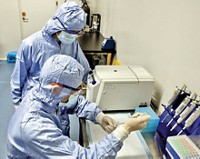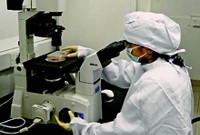Advertisement
Grab your lab coat. Let's get started
Welcome!
Welcome!
Create an account below to get 6 C&EN articles per month, receive newsletters and more - all free.
It seems this is your first time logging in online. Please enter the following information to continue.
As an ACS member you automatically get access to this site. All we need is few more details to create your reading experience.
Not you? Sign in with a different account.
Not you? Sign in with a different account.
ERROR 1
ERROR 1
ERROR 2
ERROR 2
ERROR 2
ERROR 2
ERROR 2
Password and Confirm password must match.
If you have an ACS member number, please enter it here so we can link this account to your membership. (optional)
ERROR 2
ACS values your privacy. By submitting your information, you are gaining access to C&EN and subscribing to our weekly newsletter. We use the information you provide to make your reading experience better, and we will never sell your data to third party members.
Pharmaceuticals
How The Internet Shipped R&D Jobs Overseas
Foreign contract research organizations grab large share of pharmaceutical research, sending chemistry jobs to Asia
by Jean-François Tremblay
August 16, 2015
| A version of this story appeared in
Volume 93, Issue 32

HQL Pharmaceuticals, a small pharmaceutical research firm based in Rehovot, Israel, has no labs. The company uses computational chemistry to come up with promising breakthrough drug candidates that it then has synthesized and tested in labs thousands of miles away in China.
HQL’s chief executive officer, Tal Parnes, and his colleagues go to China to meet their research partners, whom they found through the Internet, only twice per year. The rest of the time, they rely on e-mails, Skype, and monitoring software to keep track of the status of their projects. “We couldn’t do what we do with just phone calls and text messages,” he says.
In the days before the Internet, the concept of awarding major chemistry research contracts to companies located across the globe would have been unthinkable, largely because there were no good ways to remotely manage the logistics of a project. Nowadays, the likes of WuXi AppTec, ShangPharma, Shanghai Medicilon, and Pharmaron in China; Syngene in Bangalore, India; or ChemDiv in Russia undertake hundreds of research projects for pharmaceutical companies large and small. The rise of foreign contract research organizations (CROs) has sent chemistry research jobs to lower-cost countries, helped large drug firms to control their research expenses, and enabled entrepreneurs to plunge into pharmaceutical research without investing in labs.
With 9,000 staff and counting, WuXi was one of the earliest CROs to start operating in Shanghai in 2000, initially focusing on chemistry research. By enabling clients to monitor the status of their projects online, WuXi grew rapidly on the backs of large drug companies looking to cut research expenses. Shifting research to foreign CROs such as WuXi has likely facilitated layoffs of R&D staff at large drug companies in recent years.
Relying on foreign contractors is part and parcel of the business model of many of the “virtual” pharmaceutical research companies that have emerged in the past decade or so in the U.S., Europe, and other parts of the world. Jay Wu, president and CEO of VM Discovery, in Fremont, Calif., says that not having labs helps to secure a more stable career path for his research managers.
“Being a lab researcher in California can be very depressing,” Wu says. Owing to their limited venture capital funding, most small biotech companies in California work on only one compound, and if that candidate fails to advance to clinical trials, as is usually the case, then everyone at the company is laid off. But if the compound beats the odds and succeeds in progressing to the clinical trial stage, the entire early discovery lab is laid off anyway. “Either way, most scientists are looking for work every three to five years,” he says.
By contrast, VM’s small overhead—largely the result of not needing to maintain lab space—enables the company to pursue at least five projects simultaneously. Compared with betting on a single candidate, the pursuit of multiple projects at once offers a much better chance of success, and that means everyone in the company—10 people or so, at the moment—can keep their jobs, Wu says. Currently, he notes, the company has a few candidates undergoing Phase II trials. VM develops oral drug candidates to treat central nervous system disorders, cancers, and other diseases. The firm relies on Chinese contractors to not only conduct laboratory work but also to manufacture small batches of its drug candidates for U.S. trials.
Pharmaceutical research is undergoing a process of global decentralization similar to that undertaken years earlier by the electronics industry, observes HQL’s Parnes, who used to work in that field. In the semiconductor industry, he says, it’s now common for chips to be designed in one place, for the various manufacturing steps to be performed in a string of locations, and for the final testing to take place in yet another country. In this way, he says, companies can utilize the competitive strengths of various locations to lower costs.
Parnes’s company, HQL, could not exist without partners performing laboratory and manufacturing work elsewhere, he adds. “A small country like Israel doesn’t have those skills and capabilities,” he says. His firm had previously worked with contract researchers in Europe but later switched to Chinese ones who are cheaper and more responsive, Parnes says. HQL is currently collaborating with Jiangsu-based Longthera Pharmaceuticals to codevelop anticancer agents. The two firms jointly rely on the contract research firm Medicilon—Longthera’s parent—for most of the actual drug development work.
Throughout Europe and North America, numerous companies prefer to outsource research work to organizations closer to home or to outfits that have unique capabilities. As a result, Western contract research firms, such as Albany Molecular Research Inc. (AMRI) in Albany, N.Y., and Evotec in Hamburg, Germany, manage to remain relevant to their customers. But as an indication that offshoring of research is here to stay, Western CROs are building up their capabilities in Asia. AMRI, for instance, has operated a lab in Hyderabad, India, since 2007.
The Internet, it seems, is breaking up the big integrated drug research lab and sending pieces around the globe.
CHEMISTRY & THE INTERNET
- How The Internet Changed Chemistry
- YouTube Chemistry
- Clickbait Chemistry
- The Digital Data Dive
- Job Search Dot Com
- The History Of The Internet And Chemistry
- Cultivating Collaborations Online
- Drug Firms Ship Research Abroad
- From Cards To Clouds
- Survey Says
- Taking Education Online
- A Conversation Starter
- Unfulfilled Internet Dreams
- Gaze Into My Crystal Flask





Join the conversation
Contact the reporter
Submit a Letter to the Editor for publication
Engage with us on Twitter